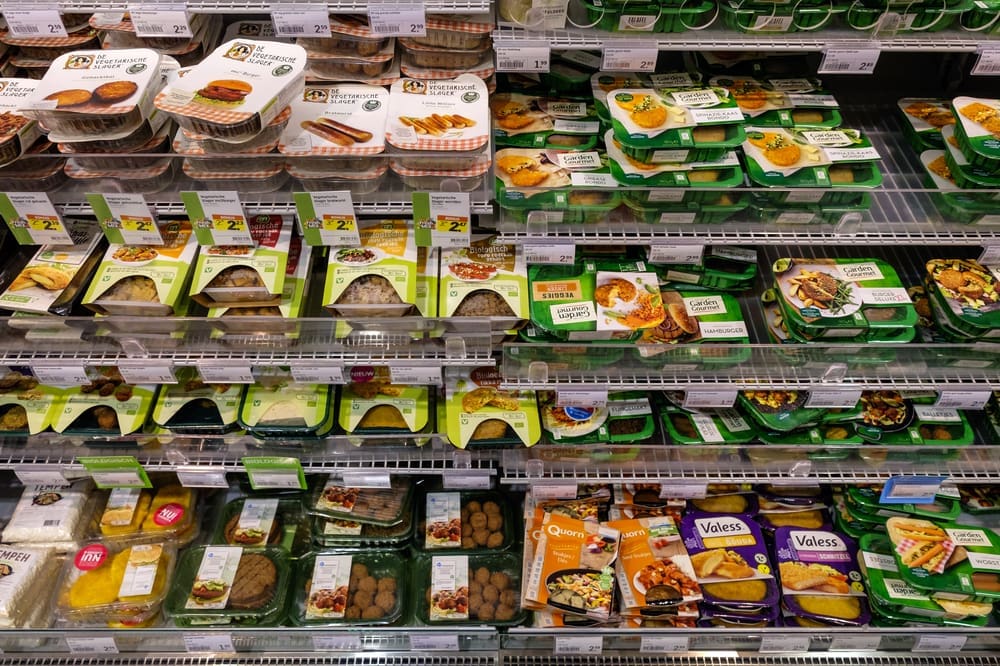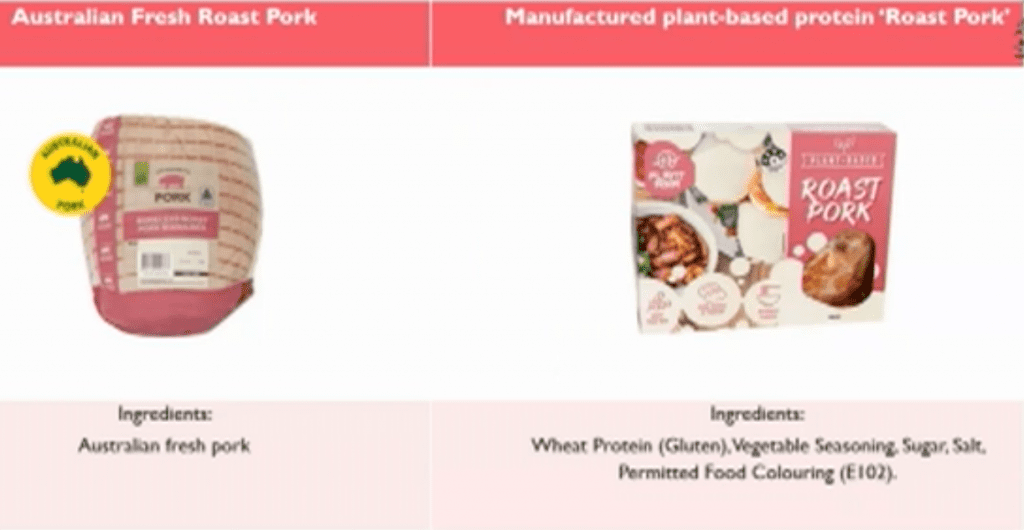
MULTIPLE examples of consumers being confused by non-meat products labelled with meat descriptors and imagery have been shared with senators conducting an inquiry into labelling this morning.

Nationals Senator Susan McDonald, who is chairing the
Senate, Rural & Regional Affairs and Transport Legislation Committeeinquiry into meat category branding.
Livestock and meat sector leaders appeared before the inquiry via video conference this morning, while a range of vegan and animal rights group representatives are due to appear tomorrow.
Meat industry groups have this morning argued that plant based/synthetic protein companies are able to exploit voluntary labelling codes to use meat descriptors in their branding, leading to consumer confusion.
They want mandatory regulation or legislation introduced by Government to ensure truth in labelling is achieved.
Meat sector groups each emphasised they do not fear competition and are not opposed to manufactured protein products being sold, but are unvaryingly opposed to marketing claims that allow plant-based or synthetic proteins to use specific meat terms such as beef, chicken, lamb or seafood or associated imagery in their labelling.
Meat producers are required to comply with wide ranging regulation and legislated standards to produce and sell their products, and each industry has invested millions of dollars over decades to develop integrity systems and quality assurance systems which underpinned the reputation and high consumer trust in their product.
A common issue expressed this morning is that plant-based protein manufacturers are being allowed under existing regulation to “piggyback” off the value their work and investment, and stronger regulation is needed to ensure everyone in the sector is competing on a level playing field.
While export orders very clearly define what can be sold as beef, lamb and chicken for example, domestic rules allow non-meat products to use meat descriptors, a process helped in part by 2016 amendment introduced by FSANZ allowing plant-based proteins to use animal protein terms, provided it also includes qualifiers in its labelling.
Livestock and meat representatives this morning said clear definitions are needed reduce consumer confusion and allow consumers to make a clear and informed choice.
Numerous examples were provided this morning of current labelling rules are allowing non-meat products are using animal descriptors and imagery in ways that were confusing to consumers.
“We have seen examples of literally a stamp with a lamb on it, so the lamb is quite clear within the circle, and around the outside of the circle it says there is no lamb in this product, obviously in much smaller writing,” Sheep Producers Australia CEO Stephen Crisp said.
“But of course a lot of people see a picture, and, well that’s it, job done.”

Bryce Camm
Australian Lot Feeders Association president Bryce Camm used the example of a plant-based protein product that is referenced in its labelling as a “Wagyu product”.
“We find that quite confounding, that a non-beef product would both use the terminology of beef being the food source of our product, but also then go further to use individual raising claims around premium brands such as Wagyu to try to falsely invite consumers or attract consumers to the product,” he said.
“And I think considering the length of investment over many generations and particularly in the last 27 years in the grainfed beef sector, the investment this industry has made in ensuring the integrity, the quality and the consistency of message in delivering to consumers what the label and what the production says that is around the product, we find quite confounding.”
Australian Pork Limited CEO Margo Andrae showed the following image to display how terms and imagery is being used by plant-based products for their own benefit.

The product on the right is not roast pork
At the moment there “was not any real regulation at all”, National Senator and inquiry chair Susan McDonald, noted, “because you are seeing products that are using the picture of an animal, the word for the animal, and then saying plant based on the packaging”.
‘Quite duplicitous’
Messaging from some plant-based protein manufacturers was “quite duplicitous”, Mr Crisp said, which further demonstrating why voluntary standards were not adequate.

Stephen Crisp
“We have some organisations, not all of them, but some of them have outright animal activists in their organisations who a few years ago openly said our objective, well I’ll quote one of them, ‘the biggest moral dilemma of our time to be addressed is the treatment of our fellow species for profit’.
“And so they obviously have got a very anti-livestock production agenda.
“The same person five years later said, ‘it is a big protein market, we’re developing our plant based proteins but there is plenty of room for conventional and plant based stuff’, so they set their message against who they think the audience is.
“This is what will happen if you have a voluntary code of conduct, they will just push the boundaries and get around it, tell the right people what they think they want to hear, and then just go on their merry way and attack our branding at the supermarket and any level they can, and this is why we’re pushing so hard in forums like this.”
The popularity of meat substitutes increased when protein manufacturers used meat and animal descriptors in their branding, Sheep Producers Australia, General Manager, Policy and Advocacy, Bonnie Skinner said.
“Their popularity starts to rise when we see that they are trying to copy traditional meat, compete with industry by making those selective claims around environmental benefits, welfare benefits, nutrition benefits,” she said.
“This is really because they intend to appropriate the parts of the meat industry that are going to be beneficial for their brand, so terms like clean meat, cruelty free, guilt free, they’re all designed to criticise the necessity of slaughter to create our natural animal protein products, and provide a product that appears to be substitutable.
“It is important to highlight that really the way forward on this to protect our sheepmeat branding and more broadly, is to make sure our labelling accurately reflects what that product is so the consumer can clearly and carefully make that choice for themselves.”
Disingenuous to suggest a qualifier is adequate
Australian Beef Sustainability Framework chair Tess Herbert said alternative products should be required to develop their own alternative words and images to market their products.

Tess Herbert
“It is disingenuous to suggest that because they use a qualifier, as they do in a lot of their advertising, that it will reduce or erase confusion in a consumer’s mind,” she said.
“We need to separate these products from our industry, they have their own resources to develop their own language, without using ours.”
The roles of the ASBF in providing an evidenced-based position on industry indicators developed in consultation with both industry and external stakeholders was a really important piece of work for the beef industry to counter claims being by alternative product promoters to denigrate real meat, she said.
The difference between plant based and real beef was that, “while they tell stories, we tell verified stories”.
while they tell stories, we tell verified stories
“So we present evidence and provide the data as to our performance, particularly on those key ones customers are asking about, environment and animal welfare
“And we can show the progress the industry has made, not just the progress but in actual fact the good story, the good verified story, about how industry is producing our product, the place of livestock in the landscape and how vital that can be, not just to the economy but also to the environment, and to nutrition as well.
“We have 50 indicators across the industry that we measure, right across the environment, animal welfare people and the community and economic resilience
“And under those 50 indicators we’re measuring what our customers are telling us is important to them.”
Vital part of the fabric of regional Australian
A lot of early discussion centred around the nature of livestock production systems, with producer representatives pointing out that much of the land used for livestock production constitutes rangelands environments not suitable for cropping or any other system of producing food for human populations.
Livestock operations provided an important custodian role from an environmental and biosecurity perspective, while the sector provided employment for hundreds of thousands of Australians.
The sector was “a vital part of the fabric of regional Australia”, Cattle Council of Australia president Markus Rathsmann said.

Cattle Council of Australia president Markus Rathsmann.
“Without it would be catastrophic,” he said.
He said research by ISO accredited organisation Pollinate had recently showen that six out of 10 consumers are being mislead by plant-based protein labelling.
“What we are keen to see is that our reputation is not damaged by any misleading claims or assertions against our product that we have invested heavily in.
“We have no problem with competition, as long as it is honest.”
Throughout the discussions the two senators taking questions today, Susan McDonald and WA Labor senator Glenn Sterle, agreed they were “on the same page” in expressing their support for truth in labelling.
“We just want to give the consumers a balanced choice,” Senator Sterle said, adding that “voluntary codes are the biggest load of bulldust”.
“It is extraordinarily frustrating, we just want to truth in labelling.”
‘I felt tricked’
Nationals senator Susan McDonald said she had seen many circumstances where people had told her they had bought a plant-based protein product labelled to look like meat product in confusion.
“Universally people who are consumers of food are saying to me ‘I felt tricked, it wasn’t clear, and I do want to make my own decisions about what it is I am consuming or I am buying to give to my family’.”
She added that since she had started this inquiry she had received “the most ugly correspondence” from people who felt they need to defend vegan foods by attacking her – stressing that she has no issue at all with vegan products and strongly supported the horticulture and grains sectors.
What if the situation were reversed?
Illustrating some of the contradictions he sees in the debate, Bryce Camm asked the committee to consider what the reception would be if the situation was reversed.
“If we were selling meat products and labelling them as vegetarian products there would be much angst amongst the community about such misleading labelling.”
Taking a similar line, Australian Chicken Meat Federation executive director Vivien Kite wondered what would happen if chicken producers mixed together a product and labelled it as beef or vege product.
“Could chicken producers put a product out there and call them vege burgers?” she asked.
“… Is this opening the way for open slather of marketing of protein?”
Is this opening the way for open slather of marketing of protein?
Queensland lot feeder and ALFA board member Barb Madden said an earlier comment from Senator Sterle likening the debate to putting a “Mercedes badge on his Mitsubishi” (which he later conceded he had incorrectly stated, pointing out he drives a Mazda) “hit the nail on the head”.

Barb Madden
“What is special about a Mercedes? It is about a driving experience, it is about trust, is about safety, it is how it makes you feel when you drive that Mercedes,” she said.
“And in my mind that is exactly what the beef industry has done over generations.
“We’re 93 years (at Smithfield Cattle Company) into producing safe nutritious food feeding families, feeding our loved ones, and it is that whole intergenerational history of that positive beef branding that I think is in jeopardy here by anyone just slapping on their label beef and meat.
“And for me they are using it as an emotional connection to a trusted product that the industry has built over such a long time.
“I really thank you all for taking this inquiry so seriously because the truth does need to come out and it does need to be legislated.”
ACCC challenged over ‘lack of evidence’ of consumer confusion
The ACCC’s position that it has seen no evidence that consumers have been misled by existing plant-based protein labelling was challenged by several witnesses.
Cattle Council of Australia senior policy officer Corinne Dooley said that while the ACCC said it had seen no evidence, it was not the sort of thing people were likely to report.
“In our experience people who are purchasing these products unintentionally learn pretty quickly and don’t buy them again.
“It is not an issue they would potentially take to the ACCC, I think that is why the ACCC is not seeing as much noise as potentially others within the industry have heard, because it is more a grievance they will come back, they will talk about to people within the industry and anyone else they’re talking about but they’re not likely to write a letter and contact the ACCC on that issue but they are most definitely likely to learn a lesson from that and be very cautious in purchasing those products again.”
Australian Chicken Meat Federation executive director Vivien Kite said she had received a number of calls from consumers who were “enraged” after mistakenly buying a plant-based product they thought was real chicken.
One in particular she recalled had written personally to the ACCC outlining their concerns.
“So to hear they haven’t received these sorts of complaints really did surprise me,” she said.
The primary issue the Senate Committee should be considering she said was the need to protect animal protein terms from exploitation “by those who are inappropriately using those terms to attract value to their products in a way that can’t be justified”.

I’m not sure how you can use that image of the plant-based roast pork as evidence. It says in two different locations on the front of the package that it’s “plant-based”. Seems a bit like you’re reaching.
The words Roast Pork are clearly the most prominent, designed to take advantage of a shopper making a split second decision. If plant-based products are so confident of demand for their product, why use plant based wording in such subordinate, less conspicuous and often obscured ways? If meat was most prominently labelled with words “vegetarian” but also contained less significant references to ‘meat based’ on the label, I suspect the reaction would be quite different